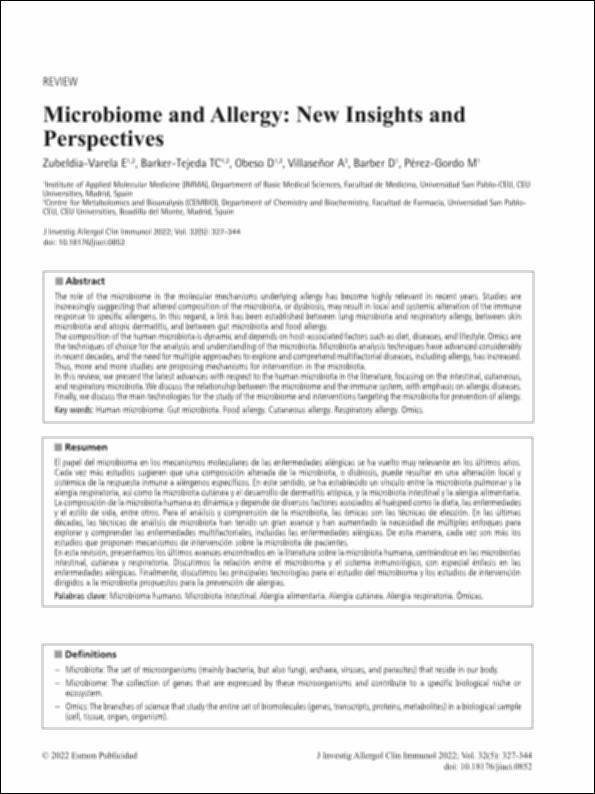Please use this identifier to cite or link to this item:
http://hdl.handle.net/10637/15283Microbiome and Allergy: New Insights and Perspectives
| Title: | Microbiome and Allergy: New Insights and Perspectives |
| Authors : | Zubeldia Varela, Elisa Barker Tejeda, Tomas Clive Obeso Montero, David Villaseñor Solis, Alma Cristina Barber Hernández, Domingo Pérez Gordo, Marina |
| Keywords: | Human microbiome; Gut microbiota; Food allergy; Cutaneous allergy; Respiratory allergy; Omics; Microbioma humano; Microbiota intestinal; Alergia alimentaria; Alergia cutánea; Alergia respiratoria; Ómicas |
| Publisher: | SEAIC |
| Citation: | Zubeldia-Varela, E., Barker-Tejeda, T. C., Obeso, D., Villaseñor, A., Barber, D., & Pérez-Gordo, M. (2022). Microbiome and Allergy: New Insights and Perspectives. Journal of investigational allergology & clinical immunology, 32(5), 327–344. https://doi.org/10.18176/jiaci.0852 |
| Abstract: | The role of the microbiome in the molecular mechanisms underlying allergy has become highly relevant in recent years. Studies are
increasingly suggesting that altered composition of the microbiota, or dysbiosis, may result in local and systemic alteration of the immune
response to specific allergens. In this regard, a link has been established between lung microbiota and respiratory allergy, between skin
microbiota and atopic dermatitis, and between gut microbiota and food allergy.
The composition of the human microbiota is dynamic and depends on host-associated factors such as diet, diseases, and lifestyle. Omics are
the techniques of choice for the analysis and understanding of the microbiota. Microbiota analysis techniques have advanced considerably
in recent decades, and the need for multiple approaches to explore and comprehend multifactorial diseases, including allergy, has increased.
Thus, more and more studies are proposing mechanisms for intervention in the microbiota.
In this review, we present the latest advances with respect to the human microbiota in the literature, focusing on the intestinal, cutaneous,
and respiratory microbiota. We discuss the relationship between the microbiome and the immune system, with emphasis on allergic diseases.
Finally, we discuss the main technologies for the study of the microbiome and interventions targeting the microbiota for prevention of allergy. El papel del microbioma en los mecanismos moleculares de las enfermedades alérgicas se ha vuelto muy relevante en los últimos años. Cada vez más estudios sugieren que una composición alterada de la microbiota, o disbiosis, puede resultar en una alteración local y sistémica de la respuesta inmune a alérgenos específicos. En este sentido, se ha establecido un vínculo entre la microbiota pulmonar y la alergia respiratoria, así como la microbiota cutánea y el desarrollo de dermatitis atópica, y la microbiota intestinal y la alergia alimentaria. La composición de la microbiota humana es dinámica y depende de diversos factores asociados al huésped como la dieta, las enfermedades y el estilo de vida, entre otros. Para el análisis y comprensión de la microbiota, las ómicas son las técnicas de elección. En las últimas décadas, las técnicas de análisis de microbiota han tenido un gran avance y han aumentado la necesidad de múltiples enfoques para explorar y comprender las enfermedades multifactoriales, incluidas las enfermedades alérgicas. De esta manera, cada vez son más los estudios que proponen mecanismos de intervención sobre la microbiota de pacientes. En esta revisión, presentamos los últimos avances encontrados en la literatura sobre la microbiota humana, centrándose en las microbiotas intestinal, cutánea y respiratoria. Discutimos la relación entre el microbioma y el sistema inmunológico, con especial énfasis en las enfermedades alérgicas. Finalmente, discutimos las principales tecnologías para el estudio del microbioma y los estudios de intervención dirigidos a la microbiota propuestos para la prevención de alergias. |
| URI: | http://hdl.handle.net/10637/15283 |
| Rights : | http://creativecommons.org/licenses/by-nc-nd/4.0/deed.es Open Access |
| ISSN: | 1018-9068 |
| Issue Date: | 2022 |
| Center : | Universidad San Pablo-CEU |
| Appears in Collections: | Medicina |
Items in DSpace are protected by copyright, with all rights reserved, unless otherwise indicated.


